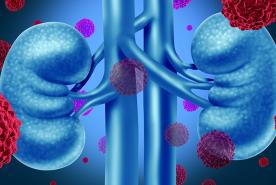January 18, 2025
Do you wake up with sudden, sharp pain in your big toe, foot, or another joint? You might be dealing with gout, a painful form of arthritis linked to high uric acid levels in the blood. Left untreated, gout can lead to long-term joint damage. It may also signal kidney issues.
What Is Gout?
Gout is a serious type of arthritis caused by a buildup of uric acid crystals in your joints. The most common symptom is intense pain, usually starting at night, in one joint, often the big toe.
The joint may also be swollen, stiff, red, and tender to the touch.
“Gout is one of those conditions that can mimic several others,” said Andrea Thompson Adams, a patient living with gout. “Knowing what you’re dealing with makes a big difference. With medication, diet, and regular movement, I manage to keep it under control most of the time.”
Is Gout Related to Kidney Disease?
Yes. Gout and kidney disease often go hand in hand. High uric acid levels can damage the kidneys over time. At the same time, if your kidneys aren’t working well, they may struggle to remove uric acid from your body, creating a dangerous cycle.
"My husband, Denis, got gout. He couldn't get rid of it. I researched and learned that uric acid build-up causes gout. For Denis, it was a sign that his kidneys were not properly functioning," said Lindsay, a kidney donor. "His kidneys were not filtering out the uric acid."
That's why gout could be an early warning sign of chronic kidney disease. Kidney disease can get worse over time and lead to kidney failure, dialysis, or even death. Knowing your risk is key.
Are you at risk of kidney disease? Take our one-minute quiz to find out.
Gout Risk Factors
Gout is most common in:
- Men over 40
- Post-menopausal women
- People with a family history of gout
You're more likely to develop gout if you have:
- High blood pressure
- Diabetes
- Obesity
- Heart disease
- Kidney disease
- Thyroid issues
- Exposure to lead
Certain medications (like diuretics or chemotherapy drugs) can also lead to gout.
Subscribe today!
Join the NKF Blog Newsletter
Get inspirational stories and kidney disease resources delivered to your inbox every month. You'll gain practical insights and expert advice to help you better understand and manage your kidney health, no matter where you are on your kidney journey.
Diagnosing Gout
A doctor can confirm if it’s gout with these common tests:
- Physical Exam and Medical History: Your doctor will check the affected joint and ask about your symptoms, family history, and medications.
- Uric Acid Blood Test: This test measures uric acid in your blood. Many gout patients aim to keep uric acid levels below 6.0 mg/dL to help prevent flares.
- Joint Fluid Test (Arthrocentesis): A small sample of fluid is taken from the swollen joint and checked under a microscope for uric acid crystals. This is the most accurate way to diagnose gout.
- Imaging Tests: Ultrasound or CT scans may be used to detect crystal buildup or rule out other causes of joint pain.
Gout Treatments
Gout can be managed, but treatment may differ if you have kidney disease. Always talk to your doctor before starting or stopping any medication.
Medications for Gout Flares
- Colchicine, which is often used during flares. The dose can be lowered for people with kidney disease.
- NSAIDs (ibuprofen, naproxen) are commonly used for pain relief, but should be avoided with kidney issues.
- Cortisone (steroids), which may be taken as a pill or injection, especially when NSAIDs aren’t safe.
Long-Term Medications to Prevent Flares
- Allopurinol and Febuxostat
- Probenecid and Lesinurad
- Pegloticase (used in severe, treatment-resistant cases, given via IV)
Lifestyle Changes
- Limit organ meats, shellfish, red meat, beer, and high-fructose drinks as they raise uric acid.
- Eat more vegetables, fruits, and low-fat dairy.
- Drink plenty of water, especially at night when crystals tend to form, unless on fluid restrictions
- Manage your blood pressure, blood sugar, and weight.
- Review medications and supplements with your doctor, as they may make gout worse.
Lowering Your Gout and Kidney Disease Risk
Here are 6 easy, daily steps you can take:
- Eat healthy and don’t skip meals
- Stay active with regular exercise
- Avoid smoking
- Drink water unless you have fluid restrictions
- Track your kidney numbers (eGFR and uACR)
- Take medications or supplements only as prescribed by your healthcare team









